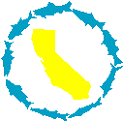CSPA |
| Your 501(c)(3) tax deductible cash donations are desperately needed if the fight for our fisheries is to continue. Read how you can donate! |
 Enter your Email address to sign up Enter your Email address to sign up for our Weekly Newsletter For Email Marketing you can trust |
More News
![]()
 CSPA/C-WIN deliver major "water issue" report to Deputy Secretary Hayes, DOI, ask for meeting upon his return to California
CSPA/C-WIN deliver major "water issue" report to Deputy Secretary Hayes, DOI, ask for meeting upon his return to California
August 2, 2009 -- Citing three issues as being most important in California's water policies, CSPA's Bill Jennings and C-WIN's Carolee Krieger have delivered a 14 page document to Deputy Secretary David Hayes, the man hand picked by Ken Salazar, Secretary of the Interior, to deal with California's "water wars."
The document, along with a sizable appendices of tables and graphs, deals with three important California water issues that affect interests of the US Department of Interior. These interests are; Irrigation drainage issues, water allocation impacts, and potential economic models for the western San Joaquin Valley, A Peripheral Canal around the Sacramento-San Joaquin River Delta and The Bay Delta Conservation Plan process.
The report states, "In sum, we believe that current efforts to develop “technological fixes” for salt and selenium-contaminated irrigated lands in the western San Joaquin Valley are vehicles for delay; these technologies are not likely to be cost-effective for agriculture without federal government subsidy. These lands should be retired permanently from irrigation;
doing so would save taxpayer funds and contribute substantially to a more reliable water future for all other Central Valley water right holders and irrigators. Such increased reliability will in turn promote economic stability, and should be legislated to free up a large amount of water for environmental restoration in the Bay-Delta’s Central Valley watershed. We also oppose a Peripheral Canal around the Delta. Finally, we regard the Bay Delta Conservation Plan process as another vehicle for delaying enforcement of laws and authorities that should instead be used as soon as possible to
protect public trust resources in the Bay-Delta Estuary and end wasteful and
unreasonable uses and methods of diversion of water."
The report goes on to reveal a number of present practices harming the delta and California's waterways including, "the natural occurrence of salts and trace metals in the marine sediments of the Valley (such as selenium, boron, arsenic, and molybdenum) polluted drainage to the San Joaquin River [which] led the State Water Resources Control Board to declare the river and several sloughs and tributaries impaired water bodies under the meaning of the federal Clean Water Act."
One of the high points of the report states that If the drainage problems were solved by retiring high salt content lands, "We believe that such solutions will free up enough water to make it unnecessary to build a Peripheral Canal or any new dams, while establishing these reallocated supplies at a fraction of the cost of these projects. By retiring as much as 1.3 million acres of land in the service areas of both the Central Valley Project and State Water Project, the Pacific Institute and other experts believe we can save as much as 3.9 million acre feet of water a year."
The issue of a peripheral canal is addressed giving numerous reasons as to the harm that would result from its operation and a large list of reasons why the canal should not be built in the first place.
The remainder of the report deals with the Bay Delta Conservation Plan stating that, "C-WIN and CSPA see the Bay Delta Conservation Plan as a vehicle for delay for environmental and economic protection of the Delta, and is likely not to result in improvements for the fisheries it is seemingly to protect. It accomplishes this window dressing function by devising operational criteria by which the State Water Project and Central Valley Project export pumps in the Delta may pump while “taking” (killing)
individuals of endangered species with the authoritative blessing of a habitat
conservation plan allowed under the Endangered Species Act."
The complete report including appendices.